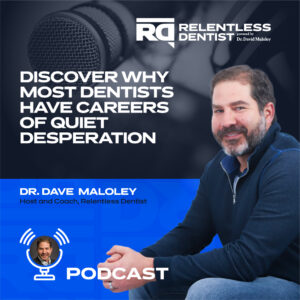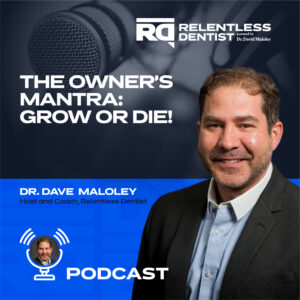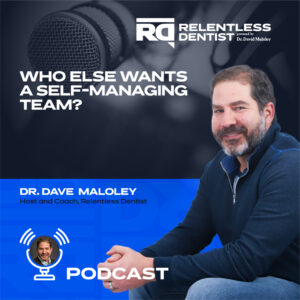by [email protected] | Apr 6, 2022 | Prescriptions for your Practice
Podcast: Play in new window | Download
 Most dentists struggle to find and retain solid employees — someone hungry, humble, and smart. This often leads to the temptation to settle for underperformers and allow culture-cancers to impact the team negatively. But the possibility is that you can have a deliberate process that helps team members understand that part of their job is always getting better at their job, constantly growing, and continuously improving.
Most dentists struggle to find and retain solid employees — someone hungry, humble, and smart. This often leads to the temptation to settle for underperformers and allow culture-cancers to impact the team negatively. But the possibility is that you can have a deliberate process that helps team members understand that part of their job is always getting better at their job, constantly growing, and continuously improving.
This week’s theme is enhancing culture. In this episode, I discuss keeping underperforming employees from undermining your culture. So if you want to:
- have a deliberate process that helps team members understand that part of their job is always to be getting better at their job;
- know when to clarify, connect, coach, correct, and collide; and
- understand what makes an employee a subtractor and what makes one a divider so that you can enhance your culture …
you need to tune in now!
Tune in and find solutions to common practice issues at Prescriptions for Your Practice.
Key Quotes:
- “Our job as owners is to make sure that everyone, a hundred percent of the team, is either onboard or we have to get them out of the way.”
- “Let’s make sure that we’re moving further, faster in the direction that you really desire for your practice.”
- “You as the owner really need to double down your focus and not only be a role model of that focus but also become great at refocusing the team.”
- “Praise and constructive criticism only work well in the presence of clear expectations.”
- “Don’t assume that there is clarity. Verify, verify, verify.”
- “It’s important that everyone on the team check their ego at the door and understand that once they clock in, their job is to take care of one another and the patients.”
- “In times of uncertainty, communication should be more abundant.”
- “All of your team members should feel like you’re betting on their success all of the time that they’re working for you. And then make sure they believe that they can pull this off.”
Featured on the Show:


by [email protected] | Mar 30, 2022 | Prescriptions for your Practice
Podcast: Play in new window | Download
 “Remember to be careful when following the masses; sometimes the “M” is silent.” — Anonymous
“Remember to be careful when following the masses; sometimes the “M” is silent.” — Anonymous
Today’s problem that we’re discussing is that we live in a society looking for bandaid solutions, quick fixes, and magic pills. These things lead to a lack of accountability, leading to a lack of results — which I call the commodity trap. I don’t want you to be in a situation chasing down the masses and living to someone else’s vision and version of success and live the rest of your life in quiet desperation. Step into the possibility that we can all choose a mastery path.
In this episode, I discuss why the masses are asses. So if you want to:
- elevate your practice owner confidence,
- avoid the pain of being a dabbler, obsessive, and hacker,
- be the most sought-after dentist in town,
- know how to prioritize your skill stack for fun and profit,
Listen now! This episode is for you.
Tune in and find solutions to common practice issues at Prescriptions for Your Practice.
Key Quotes:
- “Lots of dentists are worried about the commoditization of dentistry, but those same dentists likely aren’t de-commoditizing themselves and working on elevating their confidence.”
- “The first move to mastery is not outward but inward — Robert Green”
- “You feel called to do certain things, or you have unique skills or unique strengths that aren’t common. They might be easy for you and really hard for somebody else. And you might get frustrated at somebody else.”
- “What we’re looking for in a dental practice is complementary strengths, complementary life’s tasks that help us synergize.”
- “The path to mastery is a windy road. Our vocation is a windy road. It is not a straight line. And so, we have to engage on this journey.”
- “Leadership and marketing are the ways that you multiply yourself.”
- “If you want fulfillment, and you want more money, and you want a better lifestyle, then the operative word is grow.”
Featured on the Show:


by [email protected] | Mar 23, 2022 | Prescriptions for your Practice
Podcast: Play in new window | Download
 I might hear you say, “That’s quite a statement, Dr. Dave.” Well, let’s put it subtly. If you’ve been religiously listening to my podcast, you’ve been hearing me say this countless times that it’s become my business mantra: “Practice isn’t limited by its opportunity; It’s limited by its leader.”
I might hear you say, “That’s quite a statement, Dr. Dave.” Well, let’s put it subtly. If you’ve been religiously listening to my podcast, you’ve been hearing me say this countless times that it’s become my business mantra: “Practice isn’t limited by its opportunity; It’s limited by its leader.”
Let’s talk about the potential, the possibility that every practice owner can embrace a CEO’s mission held in one word — GROWTH. So let’s get into that whole growth idea and what it means to you as a practice owner at the beginning and end of every quarter because I think you should sit down at the end of every quarter and give yourself an hour — this is CEO time to ensure that you’re enjoying more and more cash flow.
Since we’re about to usher in Q2, we have a heavily-packed episode today in line with our week-four theme, enjoying cash flow. Today’s podcast will discuss the six questions you need to ask yourself every quarter. We’ll look into the five machines that create the macro system in your business. And lastly, we’ll dig deeper into three different angles to distill down your growth. So that’s a lot to chew on as you grow or die in Q2 of 2022. Let’s get started!
Tune in and find solutions to common practice issues at Prescriptions for Your Practice.
Key Quotes:
- “Status quo is a dangerous delusion.”
- “I don’t think a status quo is real. I think you’re either getting better or getting worse as a human, as a business owner, and as a business.”
- “Your mission is to grow on multiple levels.”
- “The concept of expansion is the natural desire of all mankind.”
- “If you’re trapped in “we are a dental practice,” you are more likely to be commoditized.”
- “When we’re planning for growth, we have to take into account that there will be obstacles and there will be challenges.”
- “The identity shift here is that this is not a dental office; this is a training and development company. If you run a training and development company, everyone is always getting better at their jobs.”
Featured on the Show:
- People: Sadhguru, yoga guru, and proponent of spirituality.
- People: Earl Nightingale, author.
- People: Denis Waitley, author, keynote lecturer, and productivity consultant.
- People: Travis Kalanick, co-founder and former CEO of Uber.
- People: Travis Bradberry, author, and co-founder of TalentSmart.
- People: Ed Mylett, podcaster, author, and keynote speaker.
- I appreciate your feedback. Let me know what you learned and loved here: [email protected].


by [email protected] | Mar 16, 2022 | Prescriptions for your Practice
Podcast: Play in new window | Download
 Approach each customer with the idea of helping him or her solve a problem or achieving a goal, not selling a product or service. — Brian Tracy
Approach each customer with the idea of helping him or her solve a problem or achieving a goal, not selling a product or service. — Brian Tracy
I want to hear your honest answer to this question: When a patient walks into your dental office, do you see them as a patient or a customer? There’s no right or wrong answer here, actually. I just want you to be conscious of how your patients perceive you. Are you coming in as a doctor providing a solution or a business person selling them products?
In today’s episode, our topic is about enthusing clients. We’ll talk about how you can humanize yourself so that your patients understand that you’re just not a lady or a gentleman in a white coat. We will have a thoughtful discussion on the six emotional cues on why patients buy — or don’t. I will also share insights on how you and your team can authentically connect with your patients and sell them a solution, not the product. So relax, press that play button, and get ready to enthuse more clients!
Tune in and find solutions to common practice issues at Prescriptions for Your Practice.
Key Quotes:
- “When we’re talking to our patients, we shouldn’t talk to their brain. We should talk to their heart.”
- “When discussing treatment with patients, our objectives should be to minimize the downside or pain and maximize the upside or pleasure.”
- “We’re talking about selling the consequences and helping them understand whatever the truth is because they will move forward for their reasons, not your reasons.”
- “All business is human to human.”
Featured on the Show:


by [email protected] | Mar 9, 2022 | Prescriptions for your Practice
Podcast: Play in new window | Download
 How close are you to having a self-managing team? Do you think it’s realistic or too utopian?
How close are you to having a self-managing team? Do you think it’s realistic or too utopian?
Before we dig into our topic, let’s look at these three powerful statistics that will help gauge your team and where you are in terms of having a self-reliant culture and robust practice.
- 60% of employees believe that their coworkers are the biggest contributor to their happiness at work.
- 63% of employees have wanted to quit a job because they feel like poor communication gets in the way of their jobs.
- 67% of employees would go above and beyond if they felt valued and engaged.
If you’re losing more than half of your staff regularly and think things are getting out of hand, you may want to look into the above realities.
This week’s topic is enhancing culture, notably establishing a self-managing team. So the problem that we’re going to be addressing today is this outdated industrial age carrot and stick management and determining the appropriate management style that best suits your team. Why? Because if you want a healthy, stable growth trajectory over the next five, ten years in your practice, making it a priority to build a self-managing team is good for you, your paycheck, your patients, and your team.
Tune in and find solutions to common practice issues at Prescriptions for Your Practice.
Key Quotes:
- “If they’re [staff] constantly feeling like they should be rewarded or punished for getting in trouble, they’re not going to be even close to their potential — they’ll tend to hide their mistakes, they’ll tend to kind of pad their stats and cut corners.”
- “One of the biggest myths in dentistry is — I’m not a good leader because I’m not charismatic. In reality, as long as your heart is in it and you’re really behind the words that you’re saying, you’re very intent to know about where the practice is headed; charisma can be a net negative depending on the situation.”
- “Happy work means productive work. Yet we tend not to spend a lot of time and energy ensuring that our teams are fully engaged and unified.”
- “There are about as many different leadership styles as there are leaders.”
- “There are some team members that if they’ve been with you a long time, they’ve become internal leaders, and you don’t really have to do a lot in terms of management because they’re forced multipliers, and they make other team members better.”
- “You can be rigid on the outcome, but you should be pretty agnostic on the path.”
Featured on the Show:


 Most dentists struggle to find and retain solid employees — someone hungry, humble, and smart. This often leads to the temptation to settle for underperformers and allow culture-cancers to impact the team negatively. But the possibility is that you can have a deliberate process that helps team members understand that part of their job is always getting better at their job, constantly growing, and continuously improving.
Most dentists struggle to find and retain solid employees — someone hungry, humble, and smart. This often leads to the temptation to settle for underperformers and allow culture-cancers to impact the team negatively. But the possibility is that you can have a deliberate process that helps team members understand that part of their job is always getting better at their job, constantly growing, and continuously improving. 



 I might hear you say, “That’s quite a statement, Dr. Dave.” Well, let’s put it subtly. If you’ve been religiously listening to my podcast, you’ve been hearing me say this countless times that it’s become my business mantra: “Practice isn’t limited by its opportunity; It’s limited by its leader.”
I might hear you say, “That’s quite a statement, Dr. Dave.” Well, let’s put it subtly. If you’ve been religiously listening to my podcast, you’ve been hearing me say this countless times that it’s become my business mantra: “Practice isn’t limited by its opportunity; It’s limited by its leader.”
